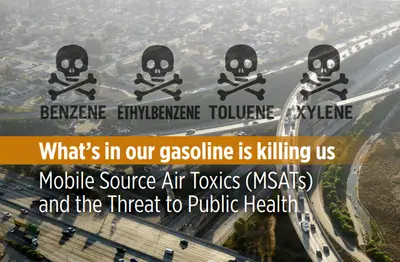SPECIAL REPORT: What's in Our Gasoline is Killing Us +VIDEO
New Report Documents Connection Between Toxic Fuel Additives, Vehicle Emissions and Human Health Threats
WASHINGTON, DC - May 7, 2019: That’s the conclusion in a new report released today which calls emissions from consumer gasoline one of the biggest health threats facing the American public. The report links a wide range of respiratory and even neurological diseases to toxic carcinogenic compounds refiners use to increase octane in gasoline.
The new Fact Book entitled What’s in Our Gasoline Is Killing Us: Mobile Source Air Toxics and The Threat to Public Health is the result of research and review of hundreds of studies and medical and technical reports. The Fact Book was produced by the Clean Fuels Development Coalition (CFDC), in cooperation with the Urban Air Initiative.
The Fact Book documents the alarming rise in air pollution and the direct correlation to increasing concentrations of benzene and other toxic compounds in gasoline that have replaced lead. These compounds have been strongly linked to health issues such as cardiopulmonary disease, lung cancer, breast cancer, asthma, premature birth, low birth weights and even autism.
“Light duty vehicle exhaust emissions are the predominant source of hazardous air pollutants that represent an exposure risk to urban residents and anyone living near a major roadway,” said David VanderGriend, president of the Urban Air Initiative. “These lethal pollutants can be directly traced to the 25-30% of gasoline additives that petroleum refiners use to increase octane.”
The primary carcinogen in gasoline is benzene, part of the family of toxics termed as “aromatics”. Benzene is classified as a known carcinogen. The American Petroleum Institute as long ago as 1948 testified before Congress that there was no safe threshold for benzene. The other aromatic compounds in gasoline are toluene, ethylbenzene, and xylene are suspected carcinogens. This combination of aromatics is referred to as BTEX.
CFDC member Doug Sombke of Farmers Union Enterprises said, “This research makes it clear that mobile source emissions are out of control—literally. Current EPA programs and models are faulty and fail to recognize the impacts of real-world fuels. If we did not learn anything from Dieselgate (the Volkswagen emissions scandal), when computers told us all is well when in reality, we were polluting the air, then shame on us because the same thing is happening with gasoline.”
A copy of the Fact Book can be downloaded by CLICKING HERE, or request hard copies at no charge by contacting CFDCinc@aol.com.



